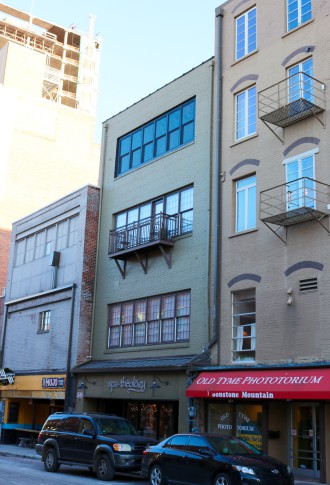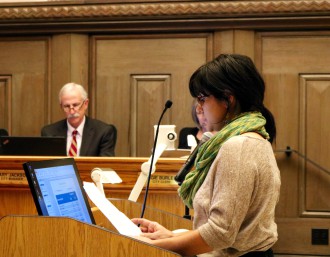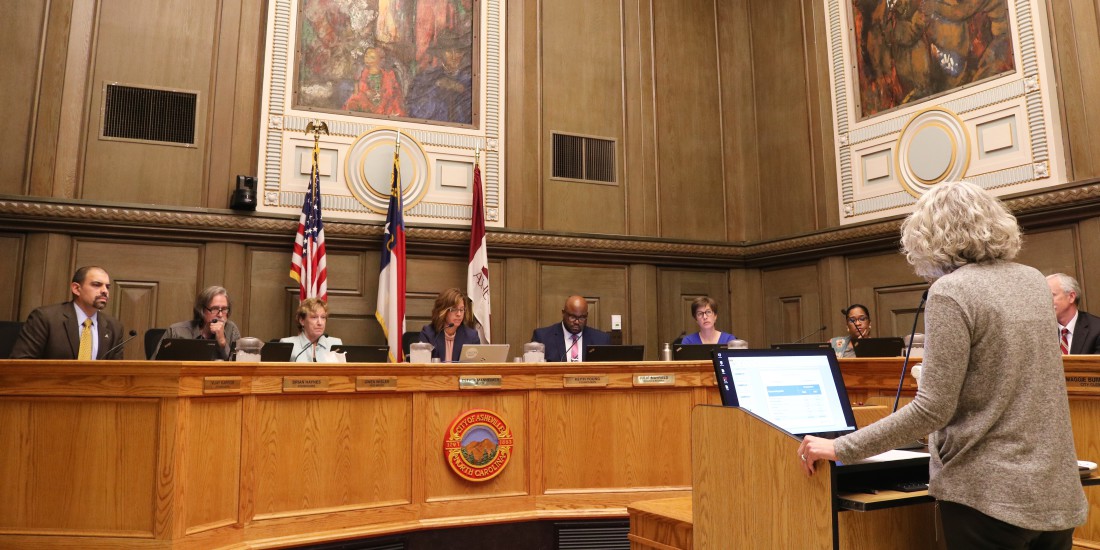In Asheville, where a tourism-driven economy has resulted in a boom for vacation rentals, the city extended an effective ban on short-term rentals from residential to commercial districts on Jan. 9.
In a 6-1 vote with Council member Keith Young dissenting, City Council approved wording amendments to the city’s Unified Development Ordinance that define short-term vacation rentals separately from other types of lodging and severely restrict where they are allowed.
Regulations clamp down on vacation rentals

Under the new rules, short-term rentals of whole units are not permitted as a use by right in any district of the city except the resort district, which exists in only a few places to allow for resorts and conference centers. Outside of that very limited area, property owners now must apply to the city for conditional zoning in order to establish a short-term rental.
The new wording defines short-term vacation rentals as “a dwelling unit with up to six guest rooms that is used and/or advertised through an online platform, or other media, for transient occupancy for a period of less than one month,” and they are considered a lodging use.
Short-term rentals are already not allowed in residential districts, with fines of $500 per night for violations. In November, City Council voted not to allow short-term rentals in commercial and mixed-use areas covered by the River Arts District and Haywood Road form-based codes. That meant that whole-unit vacation rentals, often offered on sites such as Airbnb and VRBO, were mainly still permitted in the Central Business District of downtown Asheville.
In October, Council heard a report on the escalating number of condo and apartment units being converted from residential to lodging use for the purpose of short-term rentals. A quick search on Airbnb brings up a plethora of whole-unit listings in the downtown area — units that otherwise could serve as much-needed housing for local residents, say proponents of a crackdown on STRs.
Planning staff presented a report to the city in December that showed 63 units had been converted from residential to lodging since 2015 (before which no such conversions occurred). Staff also pointed to 84 units in residential condo projects in the pipeline that could apply for lodging permits in the future.
Zoning Administrator Shannon Tuch said at the Jan. 9 meeting of City Council that since the December report, the city has received applications to convert an additional 53 units from residential to lodging uses.
All the units already permitted for use as STRs can continue to be rented that way, but must now get an annual permit from the city. Homestays, where residents can rent out up to two guest rooms in their homes, will still be allowed.
Residents sound off on meaning of community

Asheville resident Moira Goree told Council during public comment that she’s had to leave several spaces that were sold to become whole-home rentals. She said she now lives in a place in such shoddy condition that it’s unlikely to be desirable as an STR. “That’s sort of the shape of things to come, I think, as far as whole-home rentals, kind of being an artist and a local, pushing me out of town,” she said.
Sue Robbins, of Downtown Asheville Residential Neighbors, said her organization supports the amendment. “We strongly believe that the proliferation of short-term rentals in an area which we consider to be our neighborhood is detrimental to the sense of community that we are trying to build and maintain as residents of the CBD,” she said.
Andy Brokmeyer spoke in favor of allowing short-term rentals in the Central Business District. “I believe it is the only district where you can allow a free market economy to take place,” he said. “I don’t want to see the fabric of downtown become a ghost town of short-term rentals such as Myrtle Beach or Folly Beach, [S.C.], but at the same time, seeing the profits just go to the hoteliers who are not a local business, not directly bringing the profits back to the local economy — that’s my biggest concern.”
Council members debate best way to create housing
Brokmeyer also took issue with how fast this short-term rental regulation moved through the process, a sentiment that was echoed by Young. “I am a little concerned about our process. I’m a little bit disappointed,” Young said.
Young said that before, during and after last fall’s city election, “Council members said they would like to have a comprehensive conversation about how we deal with short-term rentals in the city as a whole, and this process seemed to move so quickly, we seemed to omit a lot of that.”

In contrast, Council member Vijay Kapoor said the volume of downtown units being converted to short-term rentals necessitated moving fast, but pointed out that it was supported by the city’s Planning and Zoning Commission and discussed at length in articles in the local news media. “I think the speed with which we moved on this was actually important,” he said.
Young addressed the contention that STRs will not really be “banned,” because property owners can apply to the city for special permission. “Yeah, you could still come to Council and petition for a short-term rental in the Central Business District, but honestly I really don’t think you’ll get it,” he said.
As for the argument that STRs take up crucial housing stock, Young said while there’s a lack of affordable housing in Asheville, he doesn’t think there’s an overall shortage of housing. “If you’ve got $300,000, you can find somewhere to live in this city,” he said.
Council member Julie Mayfield agreed that restricting STRs is not targeted at creating more affordable housing, but she believes Asheville is experiencing a housing shortage and this regulation could help alleviate that crunch. “It is a tried-and-true, long-standing strategy: If you have a shortage of housing, you need to build housing,” she said. “Even by adding $400,000 condos downtown, we are contributing ultimately — this is actually one place where I think the phrase ‘trickle down’ actually works.”
Mayfield supported the amendment as a way to stem the tide of lost housing. “If you are building a unit that someone can live in — it has a bedroom, a bathroom, a kitchen — we want that to be used for someone to live in it long term. That is the way that we help address our housing shortage,” she said, adding that having housing downtown can help keep it from becoming “a Folly Beach or a Gatlinburg or something like that.”
The full amendment approved on Jan.9 can be viewed here.
Task force gets energized for branding campaign
Council heard an end-of-year update on the Energy Innovation Task Force from Jason Walls of Duke Energy. The EITF was established in 2016 as a joint project of Buncombe County, the city of Asheville and Duke Energy Progress to move Western North Carolina toward clean energy.
“We are in a good place. I think a lot of us have wanted to move faster and further than we have in this last 18 months, but we also recognize that we know more today than we did when we started,” Walls said. “I think it’s important to reflect on something that we’ve all become very good at understanding: that our greatest opportunity through the Energy Innovation Task Force is that we’re all sitting around a common table now.”
Council voted unanimously to reallocate $25,000 of funds already budgeted for EITF to a new Blue Horizons Project aimed at getting the public involved in reducing energy use. The city, Duke and the county will each contribute $25,000 toward the marketing and outreach campaign, including creating a campaign coordinator position to be housed at the Green Built Alliance.
In October, when Mayfield first broached the idea of the city spending $25,000 for the Blue Horizons campaign, she faced some pushback, as Council members expressed concerns about staff time being allocated to the initiative, but at the January meeting, those concerns did not surface.
Vice Mayor Gwen Wisler shared that she’d spoken to Mayfield about the importance of having measurables as part of the EITF’s plan. “The description right now looks to me a little squishy,” she said. “Julie has assured me that that is built into the plan, but, you know, Council needs to see what the goals are and how they got met and how we’re going to continue to ratchet up those benchmarks.”
Mayfield said the partnership is unique in the country and Duke is looking at EITF as a potential model to use in other communities. She added that it’s not a “one and done,” saying, “For us to continue to achieve the goals of the Energy Innovation Task Force, as well as the city’s sustainability goals around energy, this will require us to participate in a long-term, multiyear partnership with these partners. That’s the way we’re going to be successful. And that will require us to consider allocations every year.”
In other business
Council unanimously approved a $240,660 contract with Atlanta-based architecture and design firm Lord Aeck Sargent to undertake a feasibility study of affordable housing at three city-owned sites: 171-179 S. Charlotte St., 81-91 Riverside Drive and 319 Biltmore Ave.
Council approved several appointments to boards and committees, including naming Wisler as the Council member serving on the newly forming city audit committee.




The regulation effort has to be based on this constitutional right. Law making bodies has to set not a uniform rule but an equal rule that protects the property rights of homeowners and its neighbors. We have to identify if the chaos in the area is of solely caused by vacation rentals or simply if the existence of them are already been observed. Find measures in which vacation rental business runs in accordance with the regulations set. Other states were able to manage vacation rental business fostering economic growth on those cities. Focusing mainly on its impact to homeowners associations and its neighbors are relatively issues losing the opportunity of vacation rental business to grow. Another great site that helps vacation rental owners find travelers is Rentalo.com — You can add your listing for free and then pay a fee when booked — check details at http://rentalo.com/vacation…
“Other states were able to manage vacation rental business fostering economic growth on those cities.”
Some may have, but other touristy areas are going through the same type of decisions.
The entire city of Amsterdam had restrictions on STRs because of heavy tourism–no more than 4 people at a time and no more than 60 days a year.
LOL, I know an STR that stays full throughout the year. Not one bit of trouble out of that place EVER. But according to LIEberals, cronies, and rich elitist, STR’s are like the devil and a big nuisance, Well of course they are if your agenda is to replace the population with wealthier people who can afford the “vision” of the insane. And the corruption of the government criminals.
Keith young states, “If you have $300,000, you can buy a home…” it amazes me how out of touch public servants can be. I wonder what percentage of the people of Asheville, that work in the tourist industry, (food, lodging, events, and all of the artists that draw the crowds to Asheville to begin with, have $300,000?
Out of touch!
Greed is a real problem in our capitalist society. And until greedy people become less greedy, these problems will continue to exist!
Nobody is saying that all available housing has to be “affordable housing.” Anything downtown is going to come at a premium, but it will be permanent housing.
LOL, but I thought banning STR’s was to keep housing in supply for working class folks lulz. So what you’re saying is that the truth behind it is to keep housing supply for rich folks that will also permeate into the burbs when you think about it. And what you and the rest of cronies really are pushing for in the end is gentrifying the town. Because let’s face it, why make it hard for rich fools who don’t want to compete with the free market. And preventing property owners from renting out their places in the heart of tourist central is like the strangest thing ever.
This is pretzel logic, the inevitable conclusion of defining oneself in opposition to a bunch of imaginary oppressors.
Explain what policies you want implemented.
Greed is a problem when your capitalist society is kept down by government who are perpetuating CRONY CAPITALISM. If you assume capitalism is keeping wages low, you’re wrong. Try a huge population of illegals who’ll work for 10 bucks and hour while Marxist tout the virtues of open borders. And the CRONY CAPITALIST make mucho bank due to not having to pay REAL wages. Restaurant owners in Asheville are telling you the same thing because they can’t find people who’ll work for the low wages and want to import cheap labor from other places. And the LIEberals are of course spouting how little the profit margins are in the restaurants even though say a Tupelo Honey takes in 10 to 15 thousand A DAY. One or two days in that instance pays their entire wages for the month, In all reality, a place like Tupelo puts at least a week of business straight into their pockets. It’s how they can expand into adjacent buildings downtown. And LIEberals are lying about profit margins in restaurants. They’re actually huge if properly ran.
I wonder if the mayor and Council are aware that so many STRs (now called STVRs) are abundant because Gary Jackson and his pals issue homestay permits for premises which are in every sense illegal STRs.
I live in a neighborhood where STRs are clustered, and new ones coming. One house nearby has a separate basement apartment which was rented month-to-month for several years but is now rented by the night as a homestay. The owner finagled a homestay permit, and when it was about to expire, the official car came from the city. Two people, a man and a woman went inside the upstairs of the house and were there about 10 minutes. Out they came and the owner then published another sham homestay permit.
So I guess the above article is just another effort of the city to fool its citizenry with more baloney.
Why do we still have so many illegal STRs in the city?